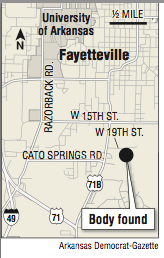FAYETTEVILLE -- The 51-year-old man whose death Thursday is being investigated as a homicide had recently tried to move from a homeless encampment into rental housing, said Glenn Miller, local mission coordinator for Genesis Church.
"He had been approved for a housing grant that would reduce his rent and pay for his deposit," said Miller.
But "property managers were rejecting him because of whatever was in his background or credit check and that kind of stuff," Miller said.
University of Arkansas, Fayetteville police on Friday released the man's identity.
George Irving Morrison was found shortly after midnight Thursday on undeveloped land owned by the university in south Fayetteville, then pronounced dead at Washington Regional Medical Center, police said. The UA-owned site is home to several homeless encampments.
Capt. Gary Crain said Friday that no arrests had been made.
Those who knew Morrison remembered his generosity and also spoke about safety concerns for those living in the encampments.
"He'd give you the shirt off his back," said Trey Stanley, who said he's living outdoors in the UA-owned wooded area.
Stanley said Morrison, known as "Michelangelo," seemed happy earlier on the night he was killed.
"I don't think he'd hurt anybody unless he had to protect himself," Stanley said, calling the man a friend.
"I was shocked about it when I found out," Stanley said of Morrison's death.
Sabrina Meyers described "Michelangelo" as a good person who would frequently seek to pray with others in the homeless community and also give rides to the store when asked. "I'm really sad," Myers said.
Police listed Morrison as being from Mountainburg, and a criminal history search using a date-of-birth obtained from court records listed five misdemeanor convictions for Morrison, none since 2011, as well as a drug conviction from 1994 listed as neither a felony nor a misdemeanor.
The search used a public database maintained by the Arkansas State Police, which does not include any criminal history from other states.
Miller, with Genesis Church, said he did not know specifically why Morrison's rental applications were rejected. He said he thought Morrison had a source of government income because of a disability, but no credit.
"You can't blame the property managers because they all do the background checks and credit checks. That's just the nature of the business," Miller said.
Genesis Church, a satellite campus of Central United Methodist Church, hosts meals three times weekly and also provides a food and clothing pantry for the needy.
"He came to us about nine months ago, started showing up at our free lunches, coming to our church, and we made friends with him," Miller said of Morrison, calling him "a person of deep faith."
After being approved approximately six weeks ago for what's called the Hearth program run by the city, Morrison "was super-excited and ready to start over," Miller said.
Morrison lived with mental illness, Miller said, adding that the program would also have helped with mental health and medical treatment.
"This would have been a completely new life for him," Miller said.
Miller said he took the man to one potential rental home, and he knew that the man had also been rejected elsewhere.
"His demeanor changed. He became very sullen and depressed and was talking to himself a lot more," Miller said, adding, "He told me, 'Why even bother? Why even try? No one cares.'"
Miller said some property managers "will give people a second chance," and he had also talked to Morrison about getting a roommate. But he stopped showing up to the church about three to four weeks ago, Miller said.
Last month, UA police described a plan in the works to patrol the encampment area, citing safety concerns.
"I think that they should," Stanley said of police patrols, though he said police must avoid being bullies to those who live in the camps.
Miller said he's been told by people who live in the camps about violence they experience, such as a man who told him about a month ago he was beaten while sleeping and robbed of his belongings. Miller also noted recent deaths that, while not ruled as homicides, he said show the unsafe conditions.
Jessica Andrews, chief executive officer for 7 Hills Homeless Center, said that while no exact count is available, the organization's best estimate is that between 80 and 100 people live in camps on the UA site. The university is in talks to sell the property, UA spokesman Steve Voorhies said, with an organization called Serve NWA proposing to build microshelters on part of the land.
"We're not here because we want to be here," Stanley said.
Metro on 05/05/2018
